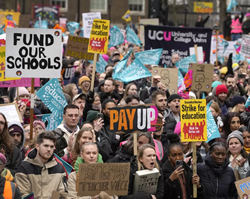 Workers in the UK have been pushed to the brink of austerity, Brexit, wage stagnation, as well as the cost-of-living creating a crisis, pushing most to them into positions they have no choice to be in.
Workers in the UK have been pushed to the brink of austerity, Brexit, wage stagnation, as well as the cost-of-living creating a crisis, pushing most to them into positions they have no choice to be in.
According to observers, British workers have hit a breaking point with half a million people including nurses, railway workers, and teachers, striking a week ago for wages that match the pace of inflation and the actual value of their labour.
Though the UK’s cost-of-living crisis has affected most sectors, it’s only the latest of a cascading series of problems for the country’s workers.
Wednesday’s strikes were the “largest in a decade”, closing schools and stopping the country’s rail service.
The UK’s public services, including the National Health Service (NHS), schools, rail and maritime services, firefighters, and police, have suffered from a lack of government investment over the past decade and, in particular, under the UK’s Conservative Party.
That lack of investment has been further amplified for the NHS due to the Covid-19 pandemic, which overloaded the already-stretched system.
The strikes have spread to civil service workers, like those in His Majesty’s Treasury and workers who manage passport applications and driving tests, over the same concerns with wage stagnation.
UK inflation peaked at 11.1 per cent last year according to the Financial Times and has been hovering around 10 per cent, but pay for public sector workers hasn’t kept up.
A proposed pay raise for public sector workers averaged around 5 per cent, with civil service workers given a raise of only about 2 or 3 per cent.
“[NHS workers] had a flat-rate pay rise of £1,400 (no matter what pay grade they were on) last year,” Anthony Barnes, a spokesperson for UNISON, the public service union, said.
“That works out at something like a 4.5 per cent pay rise on average.
“That might sound okay, but inflation has been around 10-11 per cent for months.”
Barnes also pointed to “catastrophic staff shortages” because workers are leaving the service for better-paying work.
“That puts extra pressure on the people who remain, and yet with pay running so far behind inflation, the pay ‘rise’ amounts to a pay cut.”
Wednesday’s strikes — and the further actions planned — indicate that the government, employers, and unions are far from a resolution. They also speak to bigger problems in the UK’s economy, going back to Brexit and before.
More than just economic demands, though, the strikes are about politics and policy — asking what kind of government can not only negotiate with workers but also mitigate some of the problems that have brought about the current economic and labor conditions.
Numerous places 4 February 2023










